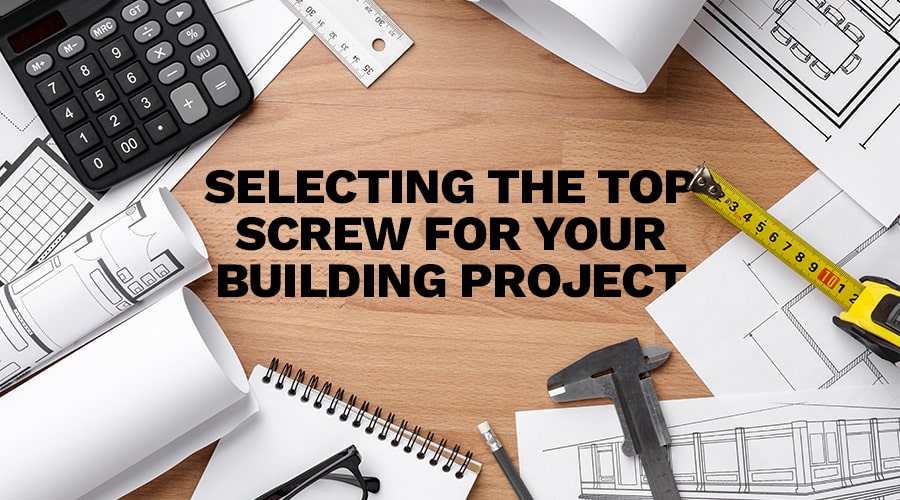


Screws, seemingly small and unappealing, play a vital role in the construction and infrastructure projects. Whether you’re building a skyscraper or crafting a wooden masterpiece, choosing the right screws is crucial for ensuring structural integrity, safety, and durability. In this blog, we’ll explore the various factors that influence screw selection and provide valuable insights to help you make the right choices when it comes to fastening components in your construction and infrastructure projects.
To select the top screw for your building project, you must first understand the different types of screws available. Each screw type is designed for specific applications, and using the wrong one can lead to structural issues or safety concerns. The most common screw types include:
These screws are ideal for woodworking projects. They have a tapered point and a coarse thread, making them well-suited for attaching wood to wood. They are available in various lengths, making them versatile for different thicknesses of wood.
Designed for fastening drywall to metal or wooden boards, these screws have a fine thread and a bugle head. They are also used for light-duty wooden works in residential construction.
For projects involving concrete or masonry, concrete screws are the go-to choice. These screws feature a hardened steel body with a thread designed to anchor securely in concrete, brick, or block.
These screws are used in conjunction with nuts to fasten metal parts together. Machine screws are available in a range of sizes and types to suit specific applications.
Self-tapping screws have a sharp point and are designed to drill their pilot hole as they are driven into materials like metal, plastic, or wood. These types are primarily used in applications or areas where pre-drilling is not possible.
Lag screws, also known as lag bolts, are heavy-duty screws with a hexagonal head and a coarse thread. They are used for connecting heavy lumber or components and are often used in structural applications.
These screws have a sharp, self-tapping point and are designed for fastening thin metal sheets. They are available in various head styles and are often used in HVAC, roofing, and automotive applications.
These screws are specifically engineered for securely fastening materials to walls, ceilings, or floors. They come in various lengths and are crucial for ensuring safety and stability in construction projects.
Now that you understand the types of screws available, let’s look into the factors that should guide your selection process:
Different joining materials require different screw materials. For instance, stainless steel fasteners are resistant to corrosion, making them ideal for outdoor applications, while galvanized screws are suitable for use in outdoor or exterior conditions. It is always good to consider the material compatibility to ensure the longevity of your fastenings.
The load-bearing capacity of the screws should match the prescribed load on the fastened components. Calculating this load is crucial to ensure the structural integrity of your project.
Consider the environmental conditions your project will face. For outdoor applications, corrosion-resistant screws are vital. In areas with high moisture content, like bathrooms or kitchens, stainless steel fasteners or brass screws may be necessary to prevent rust.
The length and diameter of the screw should be appropriate for the thickness of the materials you’re fastening. A top screw for your building project that is too short may not provide sufficient grip, while one that is too long may protrude or damage the material.
The thread type, whether coarse or fine, plays a role in the holding power of the screw. Coarse threads are better for soft materials, while fine threads are ideal for harder materials like metal.
The choice of head type, such as flat, pan, or hex, depends on the application. A flat head is typically used for a flush finish, while a hex head provides more torque for applications that require a stronger grip.
Consider the drive type, which includes slotted, Phillips, square, Torx, and hex drives. The drive type impacts the ease of installation and the tool required for the job.
Some screws come with special coatings or finishes that enhance their performance. For example, zinc-coated screws are often used for added protection against rust.
Selecting the top screws for your building project is not a task to be taken lightly. The choice of screws can significantly impact the safety, durability, and aesthetics of the final result. By considering the type of screws, material compatibility, load-bearing capacity, environmental conditions, length and diameter, thread type, head type, drive type, coating and finish, you can make informed decisions that will ensure the success of your project.
In summary, investing in high-quality screws that are tailored to your specific project needs is an essential step in achieving a strong and reliable construction or infrastructure project. For best quality results it is always best to opt for high-quality offerings from LP Screw, India’s emerging MS & SS screw manufacturer. With a robust & reliable manufacturing setup and lakhs of satisfied customers, we are the go-to manufacturer for all your evolving screw requirements.